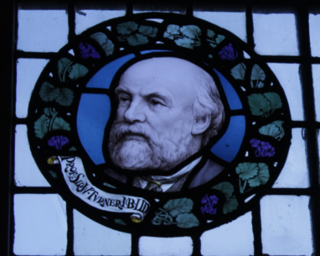
The Royal Horticultural Society (RHS), founded in 1804 as the Horticultural Society of London, is the UK's leading gardening charity.

The Zoological Society of London (ZSL) is a charity devoted to the worldwide conservation of animals and their habitats. It was founded in 1826. Since 1828, it has maintained London Zoo, and since 1931 Whipsnade Zoo.

The Royal Society of Edinburgh (RSE) is Scotland's national academy of science and letters. It is a registered charity that operates on a wholly independent and non-partisan basis and provides public benefit throughout Scotland. It was established in 1783. As of 2021, there are around 1,800 Fellows.

Sir William Huggins was a British astronomer best known for his pioneering work in astronomical spectroscopy together with his wife, Margaret.

The Royal Asiatic Society of Great Britain and Ireland, commonly known as the Royal Asiatic Society, was established, according to its royal charter of 11 August 1824, to further "the investigation of subjects connected with and for the encouragement of science, literature and the arts in relation to Asia." From its incorporation the society has been a forum, through lectures, its journal, and other publications, for scholarship relating to Asian culture and society of the highest level. It is the United Kingdom's senior learned society in the field of Asian studies. Fellows of the society are elected regularly and include highly accomplished and notable scholars of Asian studies; they use the post-nominal letters FRAS.

The Royal Meteorological Society is a long-established institution that promotes academic and public engagement in weather and climate science. Fellows of the Society must possess relevant qualifications, but Associate Fellows can be lay enthusiasts. Its Quarterly Journal is one of the world's leading sources of original research in the atmospheric sciences. The chief executive officer is Liz Bentley.
The Camden Society was a text publication society founded in London in 1838 to publish early historical and literary materials, both unpublished manuscripts and new editions of rare printed books. It was named after the 16th-century antiquary and historian William Camden. In 1897 it merged with the Royal Historical Society, which continues to publish texts in what are now known as the Camden Series.

The Royal Entomological Society is devoted to the study of insects. Its aims are to disseminate information about insects and improving communication between entomologists.

Sir Alexander Grant, 10th Baronet, FRSE was a Scottish baronet, landowner and historian who served Principal of the University of Edinburgh from 1868 to 1884. He had strong links to India, especially Bombay.

Sir William Turner was an English anatomist and was the Principal of the University of Edinburgh from 1903 to 1916.

The Department of Physics and Astronomy at the University of Manchester is one of the largest and most active physics departments in the UK, taking around 250 new undergraduates and 50 postgraduates each year, and employing more than 80 members of academic staff and over 100 research fellows and associates. The department is based on two sites: the Schuster Laboratory on Brunswick Street and the Jodrell Bank Centre for Astrophysics in Cheshire, international headquarters of the Square Kilometre Array (SKA).

Archibald Smith of Jordanhill was a Scottish barrister and amateur mathematician.
Sir James Walker FRS FRSE FCS LLD was a Scottish chemist.

The Veitch Memorial Medal is an international prize issued annually by the Royal Horticultural Society (RHS).

John Gough Nichols (1806–1873) was an English painter and antiquary, the third generation in a family publishing business with strong connection to learned antiquarianism.

Alexander Buchan FRS FRSE was a Scottish meteorologist, oceanographer and botanist and is credited with establishing the weather map as the basis of modern weather forecasting. He also proposed the theory of Buchan Spells.
The Botanical Society of Scotland (BSS) is the national learned society for botanists of Scotland. The Society's aims are to advance knowledge and appreciation of flowering and cryptogamic plants, algae and fungi. The Society's activities include lectures, symposia, field excursions, field projects and an annual Scottish Botanist's Conference, held jointly with the Botanical Society of Britain and Ireland for exchange of information between botanists working in different areas. Its publications include a twice-yearly newsletter, BSS News, and a scientific journal, Plant Ecology & Diversity. The society is closely linked to the Royal Botanic Garden Edinburgh and the Scottish universities.
Ian W. Archer FRHistS is a historian of early modern London and the Robert Stonehouse Tutorial Fellow in History at Keble College, University of Oxford.
Ryan Hanley is a British professor of history at the University of Exeter. He specialises in race and slavery in modern Britain, with a focus on the perspectives of people of African descent.














